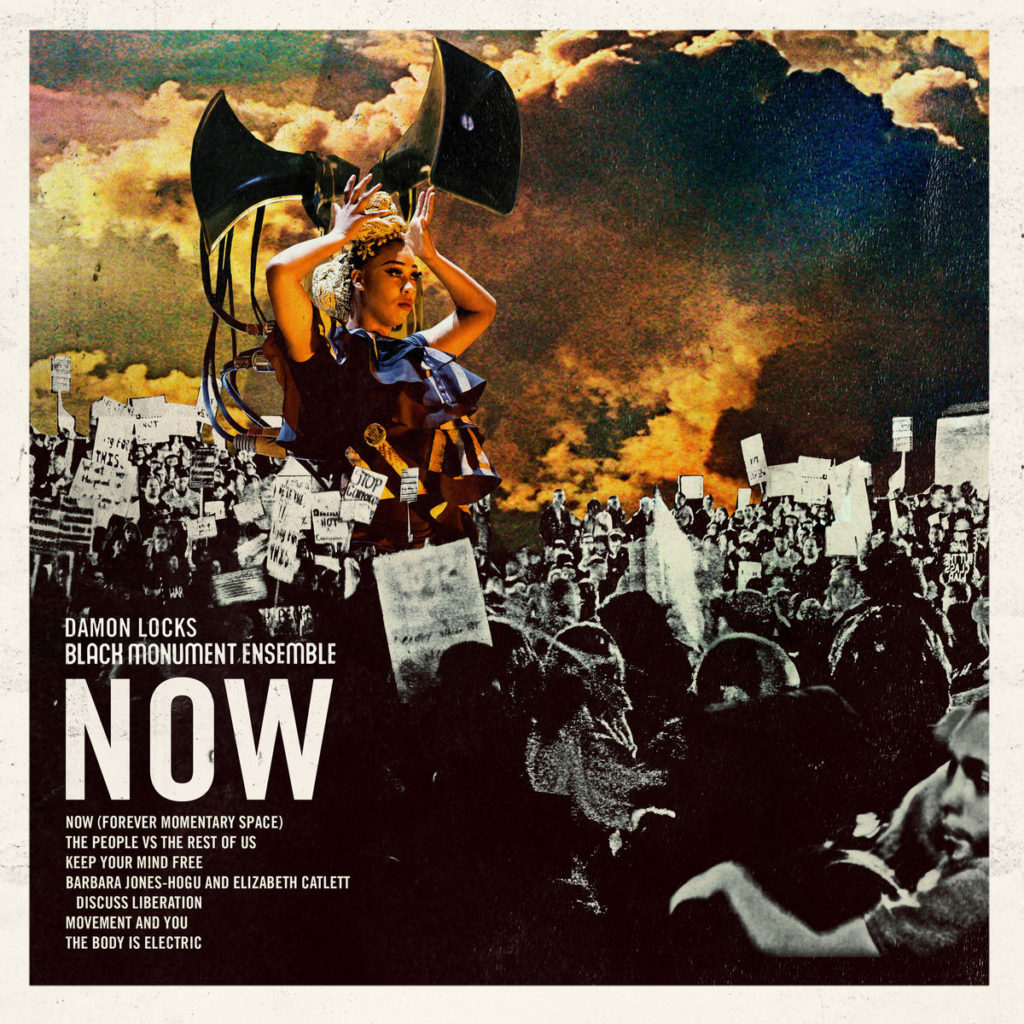
No More Beatlemania, Once Was Enough!
It’s Time for Damon Locks Black Monument Ensemble Mania!
NOW (International Anthem)
A few years ago, I saw Stevie Wonder perform Songs in the Key of Life in Hartford. Blissful disbelief had me floating all night. I still can’t believe I had the privilege of seeing a genius of that magnitude performing an album that good. No one blends harmony, melody and rhythm like Stevie, especially on Songs in the Key of Life. His 1976 masterpiece shows him at full stride and serves as an invitation to join something larger, kinder, deeper—in all ways better. That holds true when I revisit those songs and it certainly held true that night in Hartford. The stage was dense with musicians and singers—guitar, bass, percussion, drums, strings, horns, a chorus. But it was never cluttered because it was all under the direction of an auteur.
In the ensuing years, it’s the wondrous spectacle of that stage, at times nearly 20 people strong, that I’ve conjured whenever I return to Songs in the Key of Life. Until yesterday. “As” came on shuffle and I heard it differently. The song still sparks that beautiful sense of awe and joy, but it finally dawned on me after all these years just how few parts Stevie Wonder was employing. He made it sound like the work of dozens, but the cast was much smaller than I pictured, just keyboards, bass, drums, and singers. The writing and performances are out of this world, but what finally came into focus was Stevie Wonder’s ability to sculpt the whole, to manage the sonic space.
***
Damon Locks led the Black Monument Ensemble through two sessions in August and September of 2020 as BLM rallies surged across Covid-stricken America. Photos depict band members recording outdoors, social distancing, masks on chins while they sing. The sense of place permeates NOW right down to the sounds of cicadas that fade in as the opening song, “Now (Forever Momentary Space),” fades out. The singers get quieter and there’s more space between their final lines. Angel Bat Dawid’s hypnotic clarinet slowly reenters the atmosphere preparing to land. The dusk’s insects saturate the setting, and the band’s banter rises in the mix.
From the end of “Now (Forever Momentary Space)”:
Singer Phillip Armstrong: “I felt that one.”
Angel Bat Dawid: “That was a forever momentary space. That was a momentary space. I really hope you all don’t cut the cicadas out. Ohh, they sounded good.”
***
It’s easy to get swept away in the dizzying array of elements Locks orchestrates so well. The radiant six-person chorus elevates and illuminates the lyrics, which are as poetic as they are anthemic. The result is pure sonic luminescence, and yet just part of the story. There’s the riveting call and response of Dana Hall’s drums and Lock’s electronics. Plus, the numerous sound bites, seemingly culled from a variety of media, that cut to the heart of countless social justice issues.
***
For the first 20-25 spins, NOW evoked an expansive feel similar to Songs in the Key of Life. But my thinking about the album evolved after my “As” reawakening. Locks has a different range of colors on his palette, but he too works with a smaller-than-you’d-guess cast and has a masterful way of placing each element in just the right place. I’d recommend NOW if it only included the soaring, wonder-of-the world-chorus and the dynamic give and go of the drums and electronics. But in addition to Angel Bat Dawid (clarinet), Locks recruited/invited Ben LaMar Gay (coronet, melodica). Dawid and Gay are are top tier bandleaders and performers. Talents of their magnitude could easily upset the balance, eclipse the rest of the ensemble. Dawid and Gay’s performances course throughout the record but never dominate.
It’s like weaving big stars into a couple of scenes, not enough to merit top billing, but more than cameos. Do they make the lobby poster? Maybe an “Also featuring…” credit? That middle ground is hard to navigate. Dawid and Gay are spot on throughout playing timeless melodies that root the songs in eras spanning time and place. Just thinking of that talented triumvirate—Damon Locks, Angel Bat Dawid, Ben Lamar Gay—flashes me to the cover of Duke Ellington’s Money Jungle. The maestro sits at the piano, working a Fedora and V-neck sweater like only an elder can. Max Roach and Charles Mingus stand next to and behind Ellington looking in. All of those guys on one record? How do you make that work? Who directs? Who defers? When it works, those questions vanish. Damon Locks and cast ensure that it works throughout NOW. There’s nary a saggy scene, no time for doubt.
***
From the end of the closing song, “The Body Is Electric”:
Phillip: “My body’s electric.”
Angel: “That was good.”
Phillip and Angel: “That’s a wrap.”
Angel: “I just want to say thank you all for these past two days. They were really wonderful.”
Phillip: “Healing. Black monument!”
Erica Rene: “Black monument!”
Angel: “Black monument!”
Again, the song slides beneath the horizon, the cicadas enter on cue, and Locks lets the band’s banter ring out as the song fades, blends the DVD extras into the main narrative, slides aside the fourth wall, heightens the camaraderie.
And yet for all its strengths, NOW is brief, only six tracks long, and over too soon. The running time is just over a half hour, most of which is devoted to the opening and closing songs, the title track and “The Body Is Electric.” These are the longest and strongest tracks and signs that as remarkable as NOW is, it may serve more as a sign of things to come.
Follow Vol. 1 Brooklyn on Twitter, Facebook, and sign up for our mailing list.
